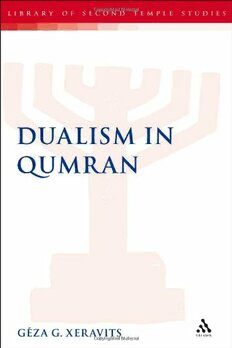
Dualism in Qumran PDF
208 Pages·2010·1.818 MB·English
Most books are stored in the elastic cloud where traffic is expensive. For this reason, we have a limit on daily download.
Preview Dualism in Qumran
Description:
This is an assessment of dualistic thinking in the Qumran material written by leading contributors in the light of two decades of Qumran research. The importance of dualistic thinking within the ''Dead Sea Scrolls'' has always been emphasised in ''Qumran Studies''. Nevertheless, in the last two decades the research on Qumran dualism seems to have been on the margins of scholarly interest. The main result of contemporary research in this area is support for the conviction that one cannot postulate compelling doctrines in the 'theology of Qumran' - the group did not want to develop a sophisticated doctrinal system; rather, they collected and mediated various aspects of the theology of their times. Since virtually all the Qumran material has been published, it is now apposite to evaluate several oft-debated topics of scholarly research. The theme of 'dualism in Qumran' is one such area in need of fresh investigation. The contributors of the present volume begin this work and open up new fields that might stimulate further reflection on the problem, assessing such issues as: the origin of Qumran's dualism; the literary growth of the passages in question; and the social/ideological setting of the dualistic passages within the Qumran Library. ''The Library of Second Temple Studies'' is a premier book series that offers cutting-edge work for a readership of scholars, teachers, postgraduate students and advanced undergraduates in the field of Second Temple studies. All the many and diverse aspects of Second Temple study are represented and promoted, including innovative work from historical perspectives, studies using social-scientific and literary theory, and developing theological, cultural and contextual approaches.
See more
The list of books you might like
Most books are stored in the elastic cloud where traffic is expensive. For this reason, we have a limit on daily download.
